A complete guide on a healthy rabbit’s diet
Just like any other pet, ensuring a balanced diet for your pet rabbit is crucial for its health and well-being. The cornerstone of a rabbit's diet is primarily high-quality grass hay, complemented by hay-based pellets, a variety of vegetables, and the occasional treat of fruits or any rabbit-safe treats.
With this nutritious approach, your bunny will enjoy optimal digestion, and their natural foraging instincts will be stimulated. Let’s dive deeper into the specifics of what constitutes a balanced diet for your furry friend, ensuring they lead a happy and healthy life.
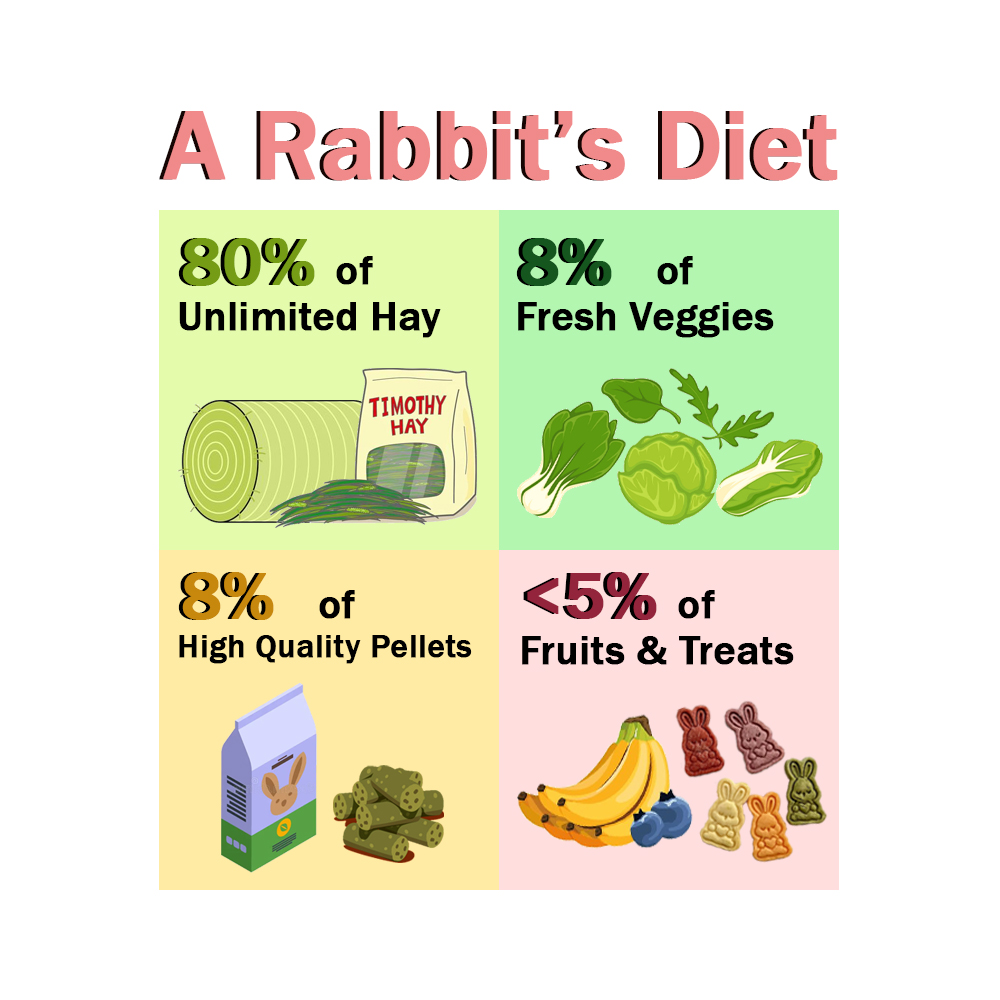
Main Food: 80-90% of Unlimited grass hay
Grass hay is an indispensable part of a rabbit's diet, constituting approximately 80-90% of their daily food intake. Common types, including Timothy hay, Orchard hay, Oat hay, Meadow hay, and Alfalfa hay, cater to the unique dietary needs of rabbits, each offering its own blend of nutritional benefits. You can check out a breakdown of the different types of hay here.
Reasons why hay should be a priority in a rabbit’s diet:
- Dental Health: Rabbit’s teeth never stop growing just like nails. Chewing on hay helps wear down their teeth evenly, preventing any dental issues.
- Gut Health: Fiber is the secret sauce for your rabbit's tummy health by generating healthy bowel movements. Hay keeps the digestive system ticking, preventing life-threatening conditions like the GI stasis.
- Behavioral Enrichment: Foraging and chewing on hay isn't just a meal; it mimics natural behaviors and provides mental stimulation for rabbits. Encouraging these activities keeps them mentally engaged and promotes overall well-being.
Young Rabbits (Up to 6 Months Old):
- We recommended alfalfa hay due to its higher protein, calcium, and calorie content. These nutrients support rapid growth and development.
- It is also encouraged to start introducing them to other hay when they’re young to prevent them from having picky eating habits!
Adult Rabbits (Over 6 Months Old):
- Transitioning to other types of hay, such as Timothy, Oat, Orchard, or Meadow hay, becomes crucial when rabbits mature.
- These hays have lower protein and calcium levels, which helps your rabbit maintain a balanced diet and minimize the risk of obesity and urinary issues.
10% of Vegetables
Including fresh vegetables in your rabbit's diet is a fantastic way to promote their overall health as it offers a range of flavors and textures that can enrich your fluffy friend's daily routine.
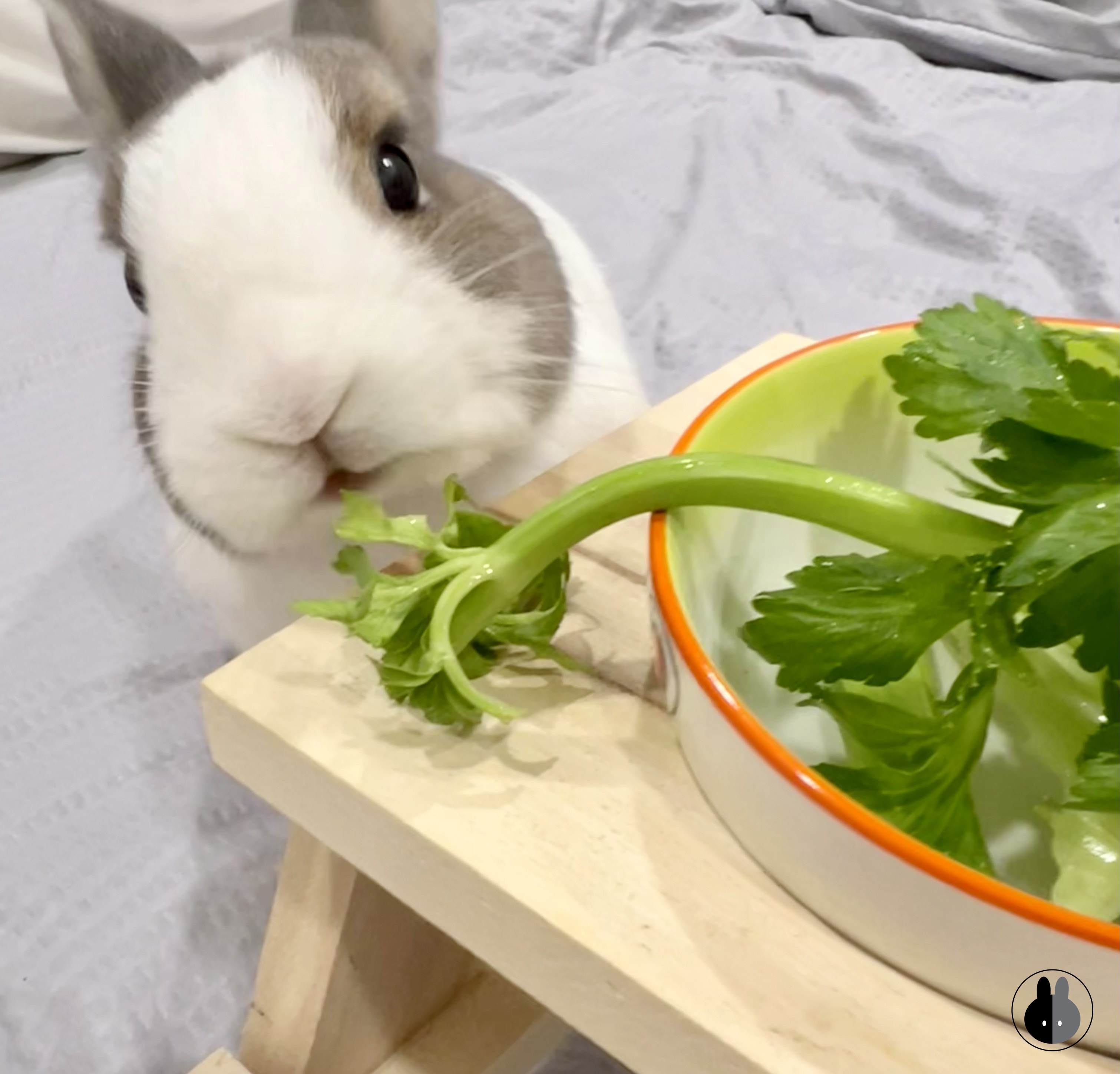
When selecting vegetables for your bunny, it's important to focus on non-starchy options, especially leafy greens and veggies that are easy on their digestive system.
Some choices of leafy greens we recommend that are easy to find at the grocery stores are:
- Arugula
- Romaine Lettuce, Butterhead Lettuce, Red Leaf Lettuce
- Parsley
- Cilantro
- Mint Leaves
- Kale
- Bok Choy
Other veggies that are safe for rabbits but should be given in moderation are:
- Bell peppers
- Beets
- Broccoli
- Cucumber
- Carrots
- Celery
- Pumpkin
Vegetables are high in water-content, over feeding them might cause diarrhea, GI stasis problems, and other gastrointestinal problems. So, just a cup of veggies daily, per 2 pounds of body weight is sufficient.
Note: Please always wash the vegetables before feeding to remove any pesticides or chemicals!
5-10% of High Quality Timothy Hay-Based Pellets
So, why do we opt for Timothy hay-based pellets? Well, there are a few reasons. These pellets are specially formulated to provide a well-rounded nutritional profile containing vital vitamins, minerals and proteins that support the overall health of a rabbit.
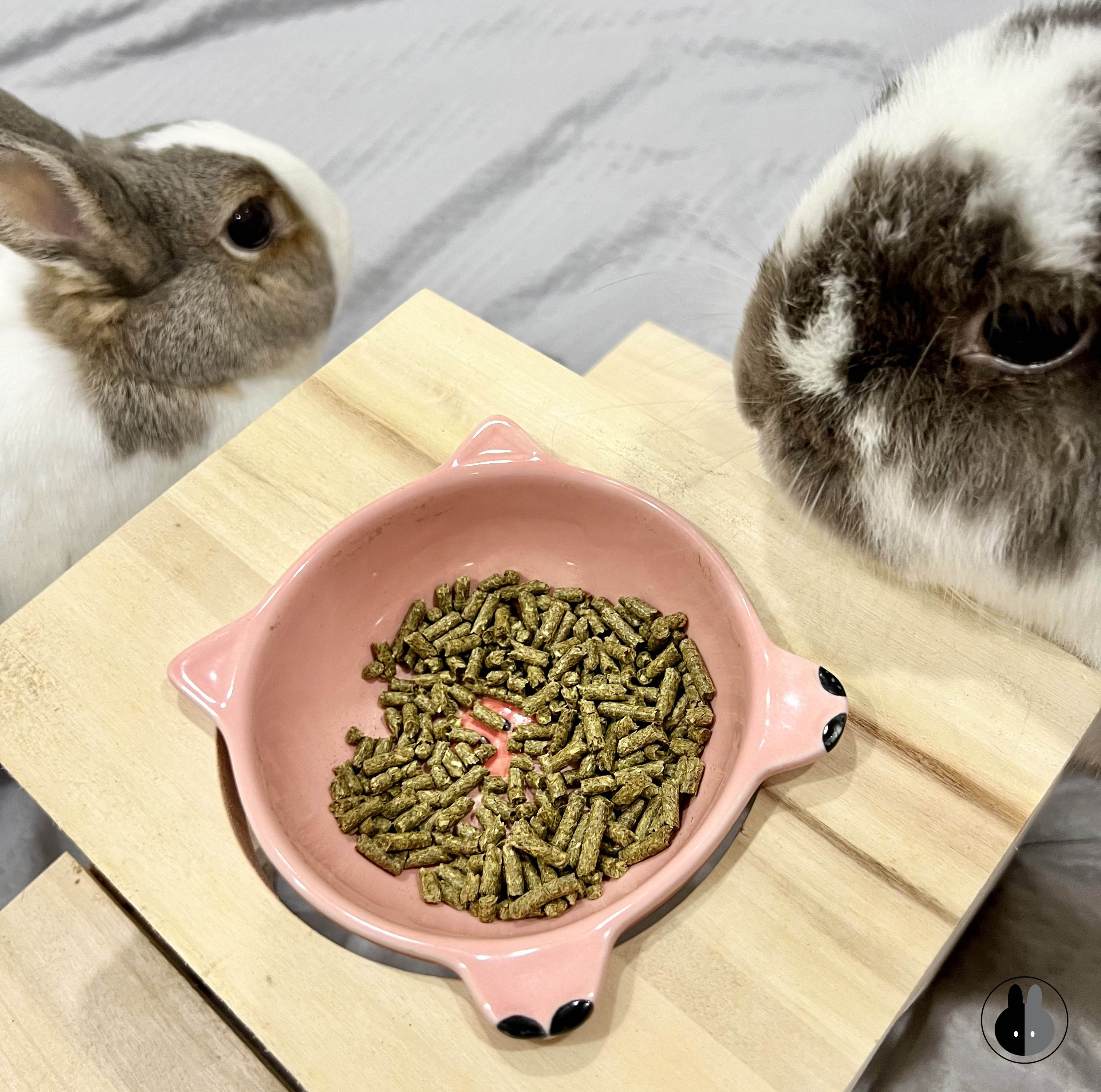
Now, when it comes to choosing the right pellets for your furry friend, it's crucial to go for high-quality options specifically designed for rabbits and based on Timothy hay. Look for pellets with a high fiber content (at least 18%), low protein (around 12-14%), and no unnecessary fillers or added sugars.
We can’t say this enough but do avoid pellets that contain seeds, dried foods or nuts. They might look like you’re getting more bang for your bucks but these mixes are not suited for a rabbit's tummy and will eventually cause health problems.
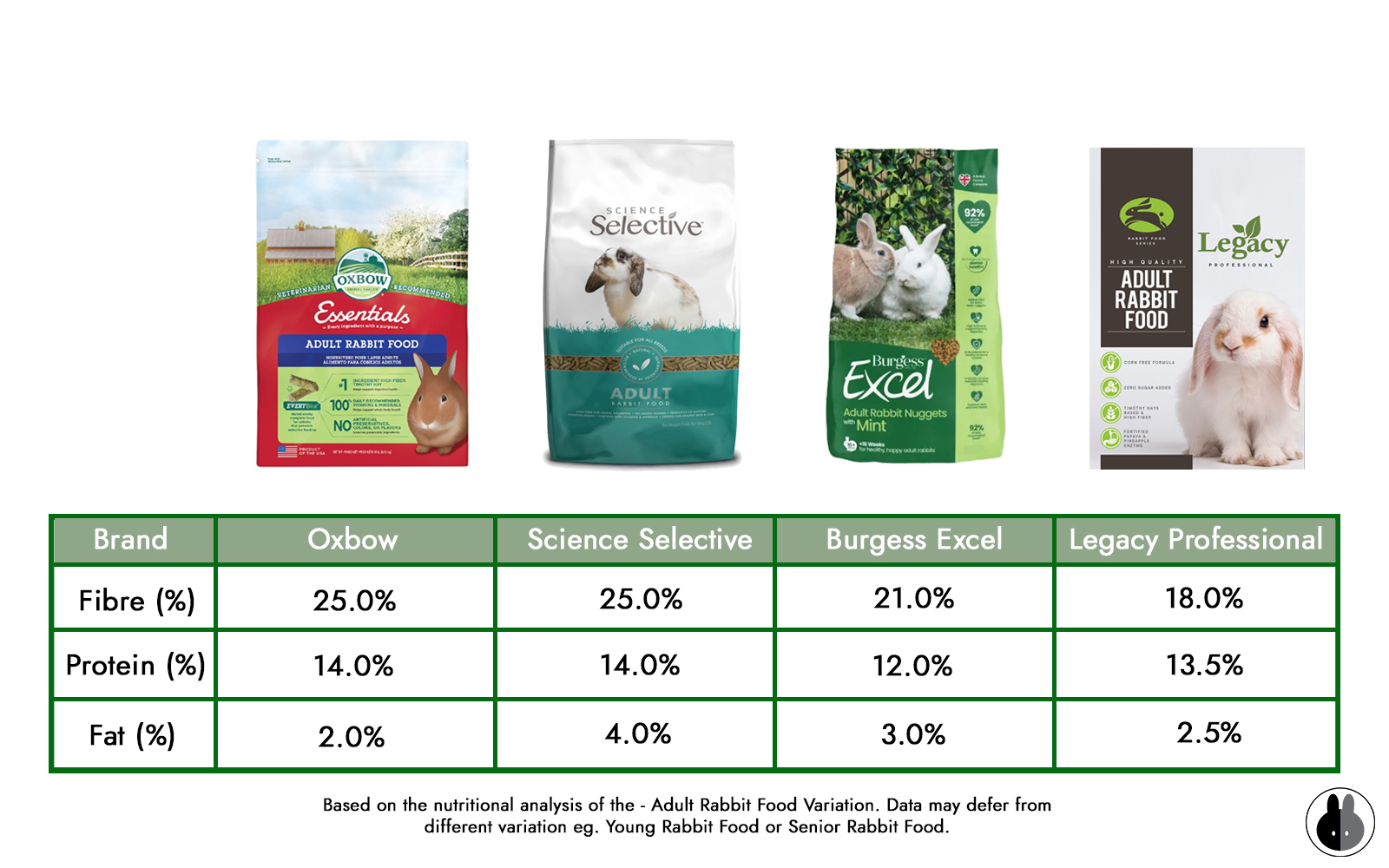
Our “two-bun”s are eating pellets from Oxbow - Essentials Adult Rabbit Food, a good quality pellet with a well justified price, which is what I am personally looking for.
There are also a few other brands that are highly recommended by the rabbit community too like:
- Science Selective Adult Rabbit Food
- Burgess Excel Rabbit Nuggets
- Legacy Professional Adult Rabbit Food (only available in Malaysia currently)
So, how much should you feed your rabbit? As a general guideline, adult rabbits usually require about 1/4 to 1/2 cup of pellets per 6 pounds of body weight each day.
However, keep in mind that the exact amount may vary based on your rabbit's age, weight, and overall health. Young rabbits and those who are pregnant or nursing may need more pellets to meet their increased nutritional needs.
Less than 5% of treats
Incorporating treats into your rabbit’s diet makes feeding time exciting and it is one way to bond with them and add joy and enrichment to their routine.
When picking the type of treats, there are many options that we can look into that are safe for your rabbit:
Fruits
Small pieces of apple (seedless), blueberries, strawberries, and bananas can be occasional treats. Fruits should be offered in moderation due to their high sugar content.
Dehydrated Fruits
Dehydrated fruits have the same nutrients as fresh fruits and can be stored for longer periods without spoiling, making them a convenient treat option as it is also easier to portion feed and create less of a mess compared to the juices of a fresh fruit.
However, because of the water content of the fruits being dehydrated, it has higher concentration of sugars, so it should be given in small quantities.
Baked Treats
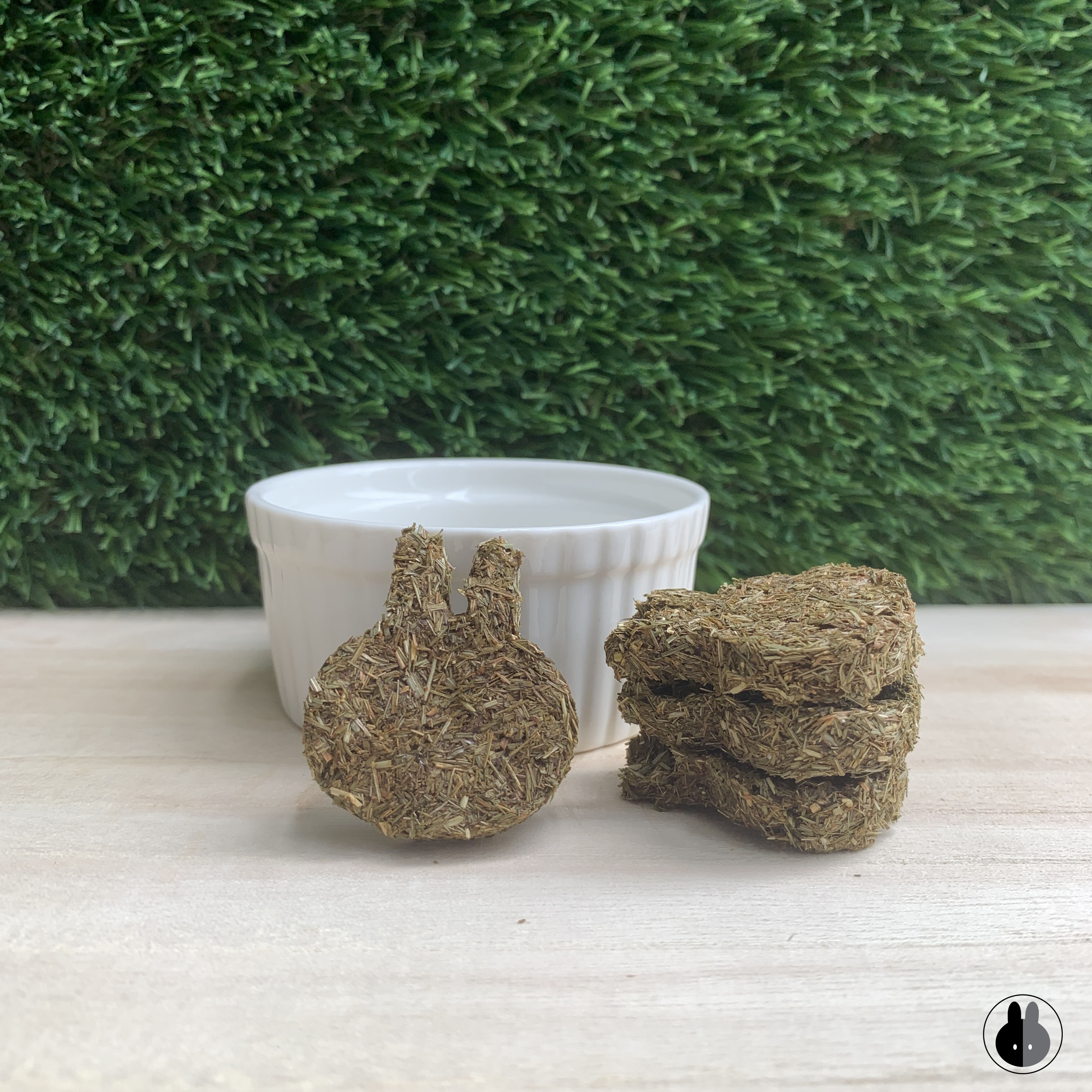
Look for natural, hay-based or oat-based treats as they are high in fiber and low in sugar and fat. Stay away from treats with artificial colors, flavors, or preservatives.
There are many commercial treats claiming its safe for rabbits (but most times they do more harm than good to their health as they are not able to digest them properly)
Avoid treats that are :
- Have seeds, nuts and grains.
- Fried or high in carbs
- Contains dairy
Dried herbs and flowers
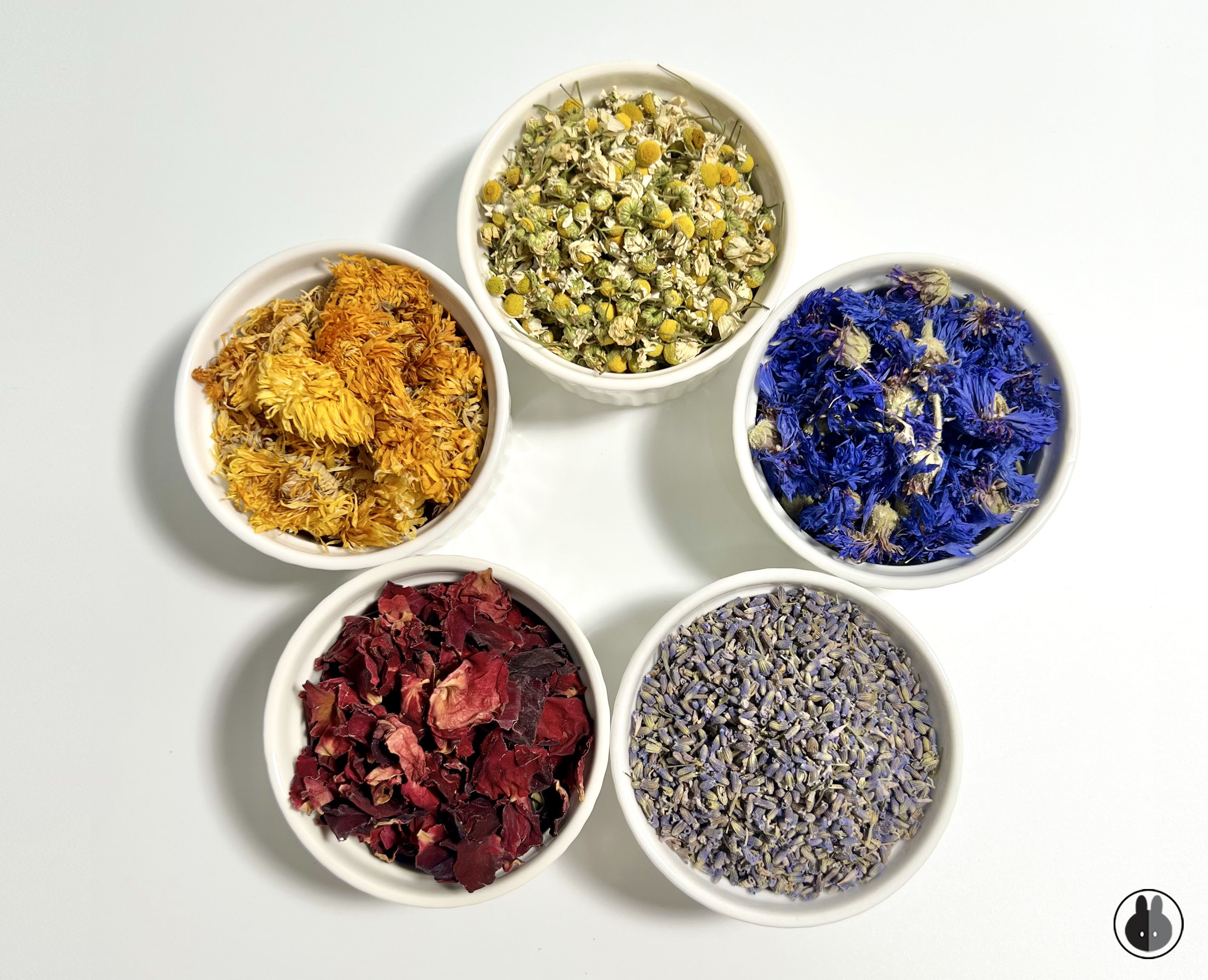
Dried herbs and flowers like dandelion leaves, lavender, rose petals and chamomile are naturally unprocessed and make a good addition to their diet. They mimic the diverse array of plants a rabbit might encounter in the wild, promoting natural foraging and chewing behaviors.
Note: Adding some dried herbs and flowers to your rabbit’s hay engages mental stimulation and can enrich their diet with more refreshing flavors.
This can also help with picky eaters as they would rummage through while eating and start nibbling on the hay.
Conclusion
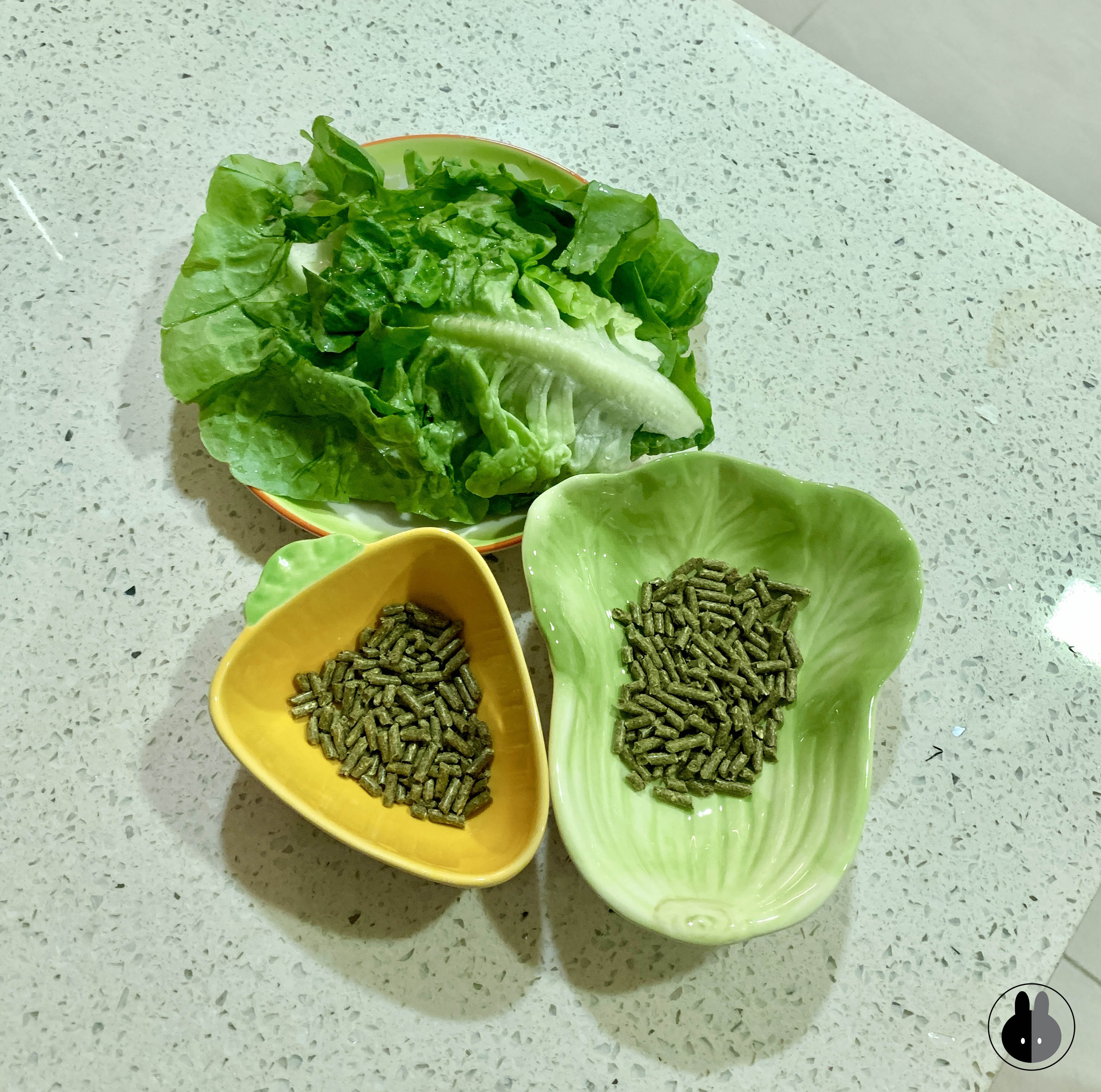
It's important to introduce any new food (hay, veggies, pellets and treats) slowly and in tiny amounts to monitor your rabbit's response. Some rabbits may have sensitive digestive systems that react poorly to even small changes in diet.
By thoughtfully integrating a variety of hay, fruits, treats, dried herbs and flowers into your rabbit's diet, you're offering an experience that nurtures not only their physical health but also their emotional well-being, making each mealtime a journey of discovery and enjoyment.
Remember, the key to a healthy rabbit diet lies in the balance.
